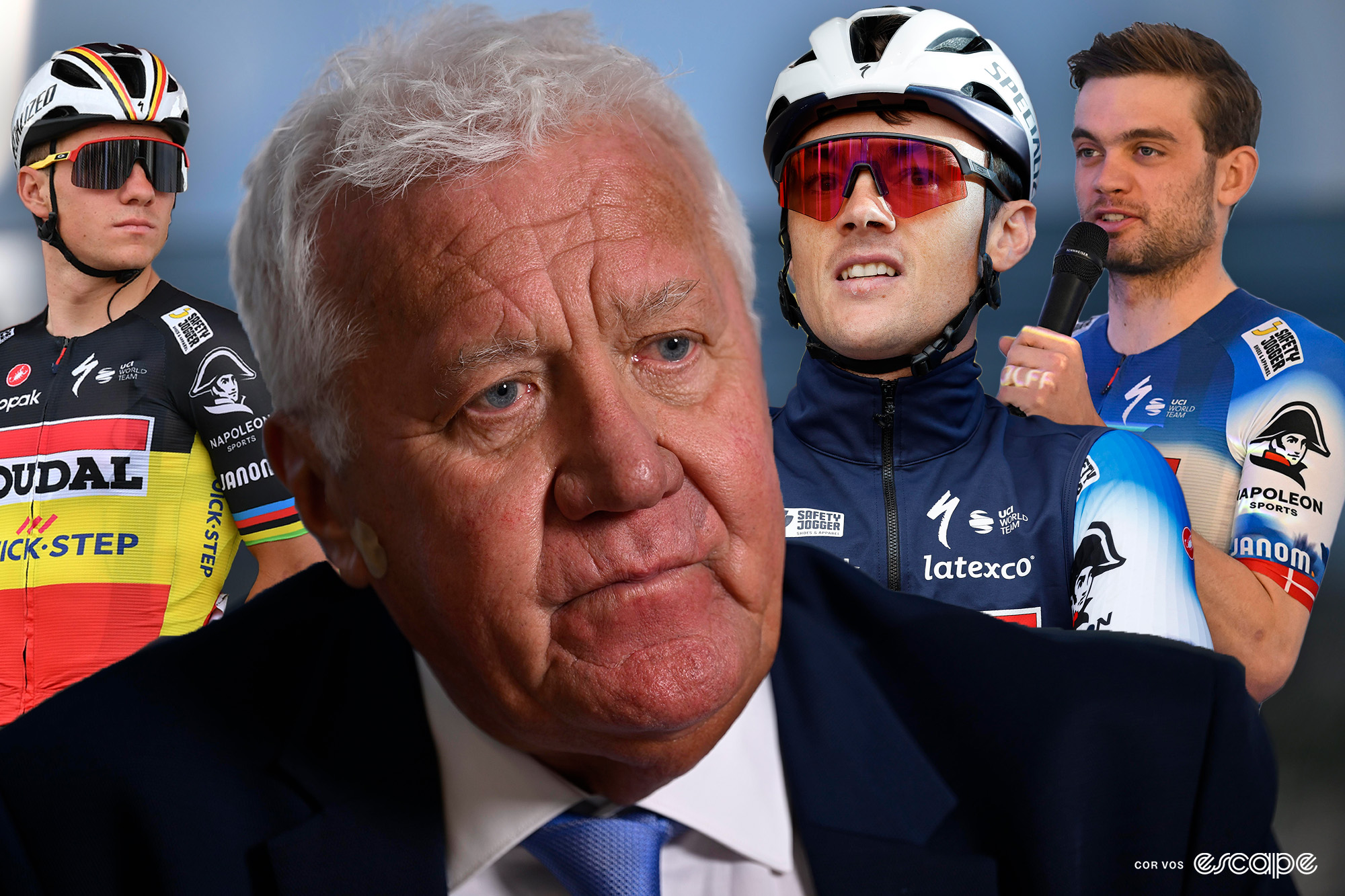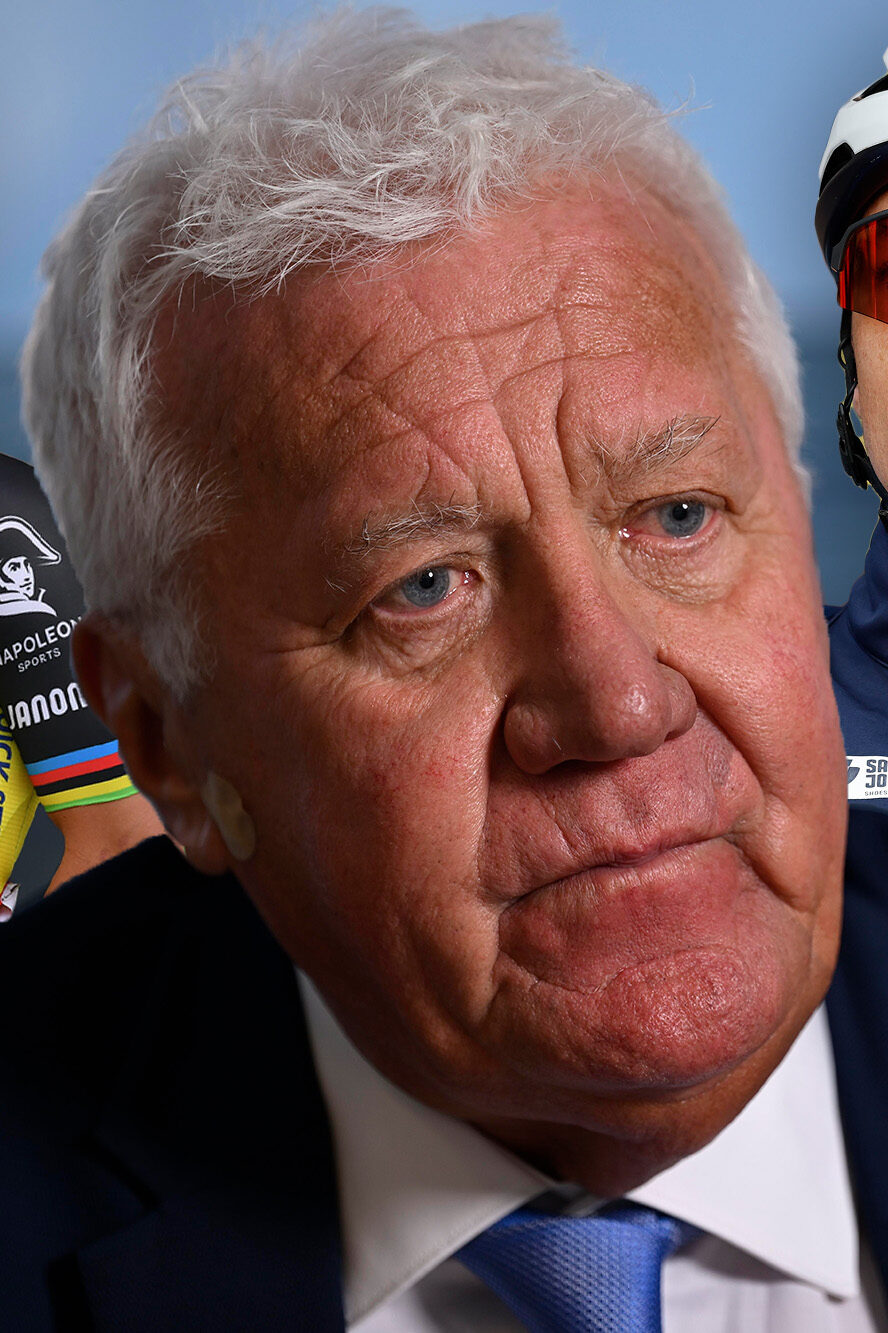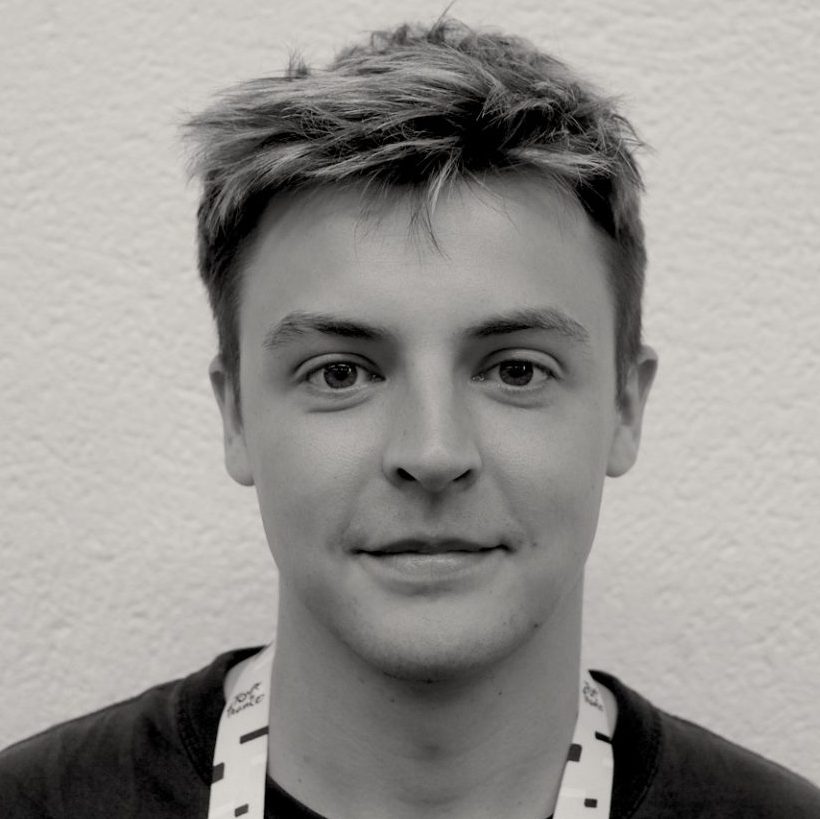At the Safety Joggers headquarters tucked away in an industrial estate on the outskirts of Oudenaarde, there is a strong sense of cycling tradition the Thursday before Roubaix.
Cycling has changed. Colleagues regale me with tales of years gone by that featured media scrums outside team buses, of French reporters in press rooms smoking pipes and thrashing away on actual typewriters, of good old-fashioned doping scandals, of interviewing riders one-on-one in their hotel rooms post-race, or as they had their massage (okay, maybe this setting of boundaries is a good thing).
But at Soudal-Quick Step, things are still done the old way. While most press conferences for the final race of the cobbled Classics season will be held via Zoom, the Belgian team are hosting theirs at their sponsor’s location. A chance for the brand to sublimate into our consciouses, to pick up a few extra easy media mentions as an add-on deliverable.
Undoubtedly, this old way is down to the old man in charge: Patrick Lefevere. He is the institution here, the reason all riders are sat upon stools sporting white Safety Jogger trainers, will try on hard hats for photo ops post-press conference, will swallow their pride and high-five the CEO for a social media video, instead of an annual trip to the Middle East to pay homage to a wealthy backer. He’s been a controversial figure for a while now, often outspoken and combative in his regular newspaper column, but unspecified comments recently spilled over the threshold of the UCI’s acceptable sexism scale, landing the 69-year-old with a suspended fine after breaching their cloudy Code of Ethics.
Without wanting to clutch pearls after the fact, should we have even been there? A guy who says stuff like he doesn’t fund a women’s team because he’s not a charity, who launches personal verbal attacks against the sacred Julian Alaphilippe?
Yet Lefevere endures. From bad headline to bad headline. Quick-Step remain, Soudal jumped over from Lotto for a piece of the Remco Evenepoel action, and Safety Jogger have rolled out their red, danger-free carpet for the boss and his riders. Is it actually Patrick Lefevere versus the world? Maybe there’s a dissonance at play, and most people simply don’t care about Lefevere’s more questionable utterances. Through it all the media are in tow because wherever Lefevere goes, a story usually isn’t far behind.
Before we get to talk to the riders, the Safety Jogger CEO gives an impassioned speech, which includes an imploring of Lefevere to get their latest sponsorship deal over the line. Lefevere chuckles and smiles back, perched behind where the media are sitting, taking it all in.
Kasper Asgreen, as the best English speaker, shoulders most of the press conference on his teammates behalf, talking potential tactics, chicanes, Mathieu van der Poels, even the slightly thorny, now well-worn issue of how Soudal are no longer the Classics behemoth of yesteryear. Empires always fall and in this very specific incident a mild-mannered and eloquent Danish man – whose 2021 Tour of Flanders stands as the team’s last victory in a WorldTour-level cobbled Classic – is left holding the bag.
After the overly formal press conference concludes, everyone breaks into smaller groups, with the TV crews now able to access the riders for their own interviews whereby the riders will effusively repeat everything they just said. Meanwhile, the written press gravitate towards Lefevere, who has stationed himself on the cream armchairs towards the back of the room. Belgian journalists are first in line to ask their own questions of the man who does a pretty good job of keeping them all in jobs.
Between Lefevere finishing with the Belgians and the English-speaking press taking their place, the boss is handed a phone showing footage from the Tour of the Basque Country. He watches as his star rider, Remco Evenepoel, flies off the road, marvelling at how he manages to keep it upright onto the grass and avoiding trees. But the aftermath shows a fractured collarbone for the former World Champion, as well as serious injury for Tour de France rival Jonas Vingegaard and Primož Roglič getting banged up too.
Maybe it’s putting on a brave face in front of a room full of journalists, but Lefevere hardly reacted. Of course, you could tell he was worried about whether his rider was okay, but had it been anyone else watching their multi-million Euro rider hit the deck and break a bone, there probably would have been a few more histrionics and swear words hurled around.
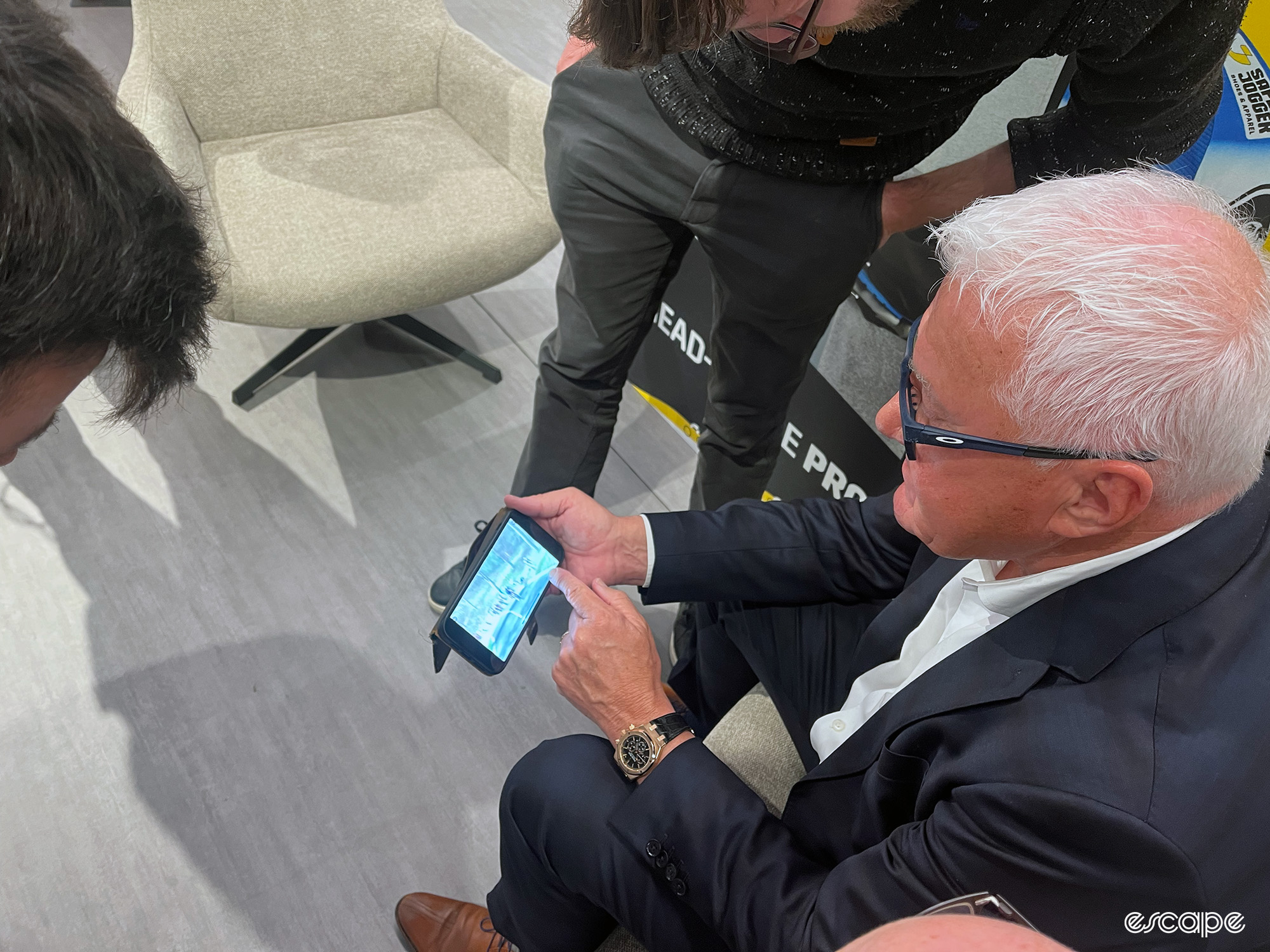
The time has now come to sit down with Lefevere. Maybe I’m a sucker, and just a journalist jonesing for a spicy quote in the knowledge that Lefevere operates something of a safe injection site as long as you’re a white male – who he still might manage to offend, but at least not mortally so.
We begin our questions with a bit of a soft-baller, but still with a bit of substance before the floodgates open and he is peppered with queries, jumping from topic to topic and back again.
“The team’s still very successful, you’ve got a strong team here, do you get tired of all the criticism? Does it get annoying? Boring perhaps?”
“I’ve paid for it,” he laughs, his accountant spirit never dies. “I joke … I think somebody has to answer the questions, sometimes you are in good shape. I don’t think it’s that bad but of course our core business is we’ve always been about the Classics of the north, but we’ve also changed the goals a little bit. We have 13 victories, in my eyes a few more but some of them don’t count.”
“About OneCycling, is the fact we’ve not heard much mean it’s not happening?”
“I prefer silence.”
“Yeah?” We respond, questioning that answer.
“Yeah, because sometimes people speak before their turn and it makes people nervous and if you can do negotiations with a small group I think things move on better. Because there were big parties on the table and we cannot be there with 18 teams, organisations, and the people who want to invest … I think a small working group, four or five people from our side, sports groups, is better. I believe it can work but a lot of people are speaking … we don’t know what the future brings.”
“There’s been talk of an impasse?”
“I don’t see your impasse.”
The one thing you have to appreciate is Lefevere’s willingness to just get peppered and not exactly shirk anything or complain about being asked something. He will answer if he has an answer; if he disagrees he will disagree. Having never been given the chance to interview – let’s pick a random example of former Ineos boss Dave Brailsford, until recently a very significant man in cycling – there is something to be said for Lefevere’s willingness to engage with people who often actively make his job a lot harder.
“What are Quick-Step’s strengths?”
“We have our heritage,” he answers, which isn’t necessarily that convincing, but he then adds he thinks the team is better suited to Roubaix than Flanders, more about endurance than explosivity.
“On Sunday what result would make you happy?”
“Well, of course, the win.”
“Only the win?”
“Only the win.”
It would turn out their best result on Sunday would be courtesy of Yves Lampaert, 36th and seven minutes down on Mathieu van der Poel. Only Lampaert, Bert Van Lerberghe, and Kasper Asgreen would actually make it to the finish from the starting squad of seven. Not since 2011 have they had such a woeful result, and at least back then it was couched between the boom of the Boonen years.
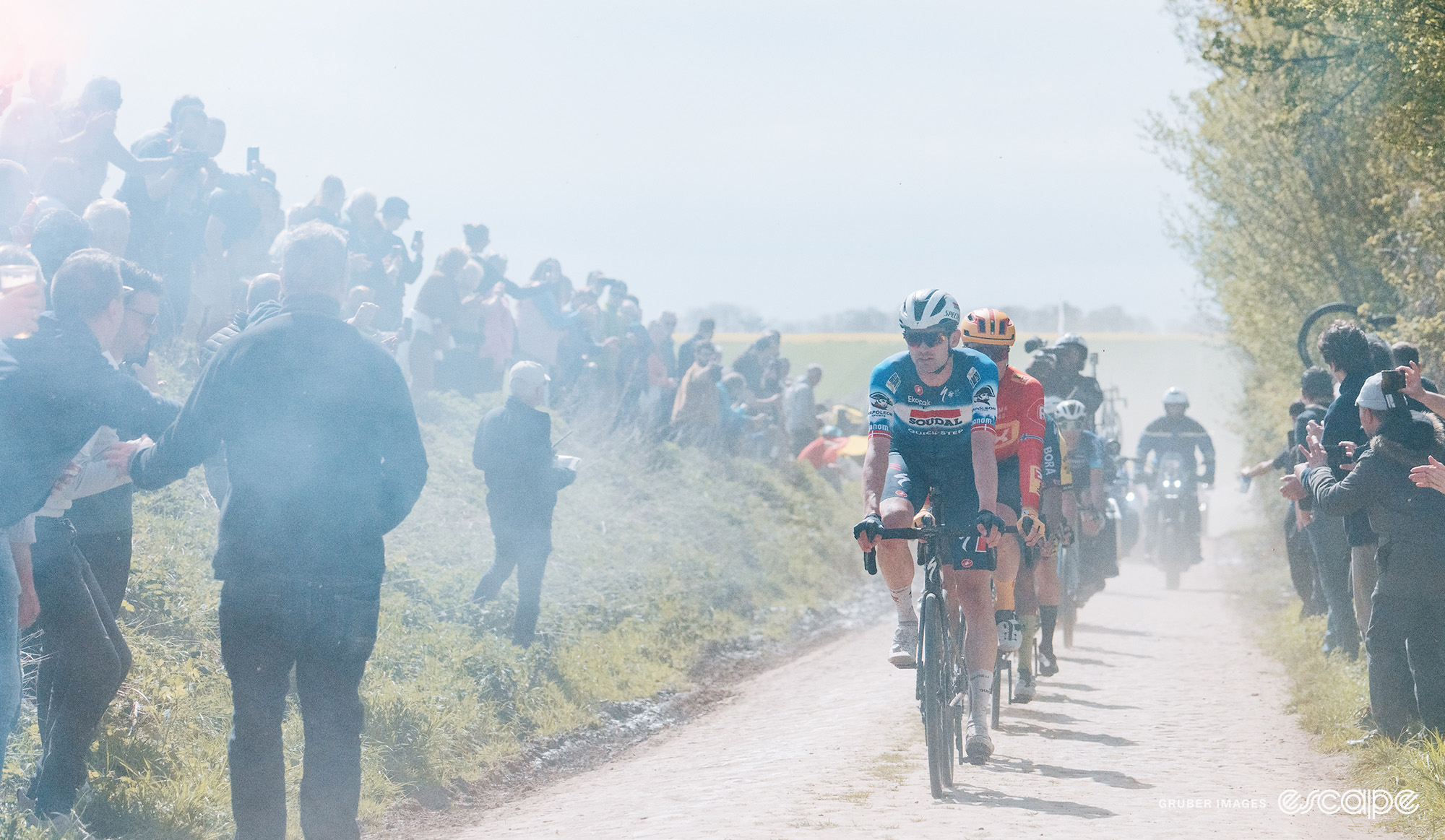
Anyway, back to before the race.
“Are you understanding what is not working right in the team?”
“I’m not superstitious first of all, but this year is not a year where everything is working well, how we like to work. Sometimes when we click everything goes well. For now we are in the corner in the battle but we try.”
“We always appreciate how you will always talk to us, but there have been criticisms of your columns, the UCI fine …”
“Why should I hide?”
“Do you think things will change in how you will speak?”
“Well maybe I have to shut up more, yes … no, I’m not a person who hides. You are a young boy [thanks Patrick, I’m 29] but I don’t know how to say this in English … it’s a kind of you can say what you want. If someone hits me in a column or he is negative about me, I will never answer. Of course if I sit down with anyone for one hour or more and you don’t really translate what I say then I think you’re a lazy guy. But if I do a column, it’s something short but it seems important because everybody reads it, or tries to translate it.”
“You don’t think you made some mistakes? Offended some people?”
“I wrote twice in my columns about this. And okay, sometimes you say something that you’re better off not having said, but I don’t know what you like, someone who says nothing. We have a lot of people who can speak to you and then at the end of the story you say they said nothing. As long as I said something in 15 minutes, that’s too much. But I’m still learning at 69 years old.”
Does this carry water? Can you just say you’re still learning and pass from gaffe to gaffe? Lefevere is still the king and this is his kingdom, and kings don’t take orders from the populace.
The interview is clearly winding down, one reporter has a last question.
“What’s your one way to make cycling better?”
“To bring more money … I don’t like to speak money, I’m fighting my whole life against teams with bigger budgets but I don’t want to cry about money. I like it, the best way is to be an underdog, to beat guys with bigger budgets, that’s the challenge.”
This is the fight that keeps him in the game, that positions his critics as merely another opponent to beat.
“So would you be in favour of a salary cap?”
“I’m democratic about budgets, and in democracy you cannot prevent someone to pay someone more than I can. It’s like this.”
We thank Lefevere for his time and wander off, leaving him to his phone and the replay of the Basque Country crash. On Sunday he misses his first Roubaix for 40 years due to illness, and the result he would have otherwise seen unfold in person would have only made him sicker.
Without Remco Evenepoel at Liège-Bastogne-Liège this year, it will prove to be a truly miserable spring for a team that is used to sealing a victorious narrative of its season on familiar home roads. But through it all, Patrick Lefevere is still there.
After publishing, we were alerted to a statement from Patrick Lefevere posted to the Soudal Quick-Step on Wednesday afternoon addressing the decision by the UCI Ethics Commission, that was not promoted via press release or social media:
On Thursday March 14th 2024, I was informed that the UCI Ethics Commission decided that 2 statements I made were in violation with the UCI ethical code. The commission refers to 2 statements I made: one in an article dd. July 3th, 2021 in ‘Het Nieuwsblad’, and one in a TV-interview dd. March 8th, 2023 in ‘De Afspraak’.
With this statement, I want to make clear that I accept the decision of the UCI Ethics Commission.
I acknowledge that the sentences referred to can be perceived in a doubtful way. It was never my intention to harm anyone, and therefore I apologize. I apologize explicitly to the UCI, the UCI Ethics Commission and to all persons concerned or who have perceived these statements in a harmful way.
The way our teams work, should also offer proof that it was never my intention to offend or harm anybody: today we employ 74 riders and 106 full time staff members, both men and women, in a diverse and inclusive work-environment with no distinction in terms of origin, gender or background. In this way, we will continue our journey.
What did you think of this story?
